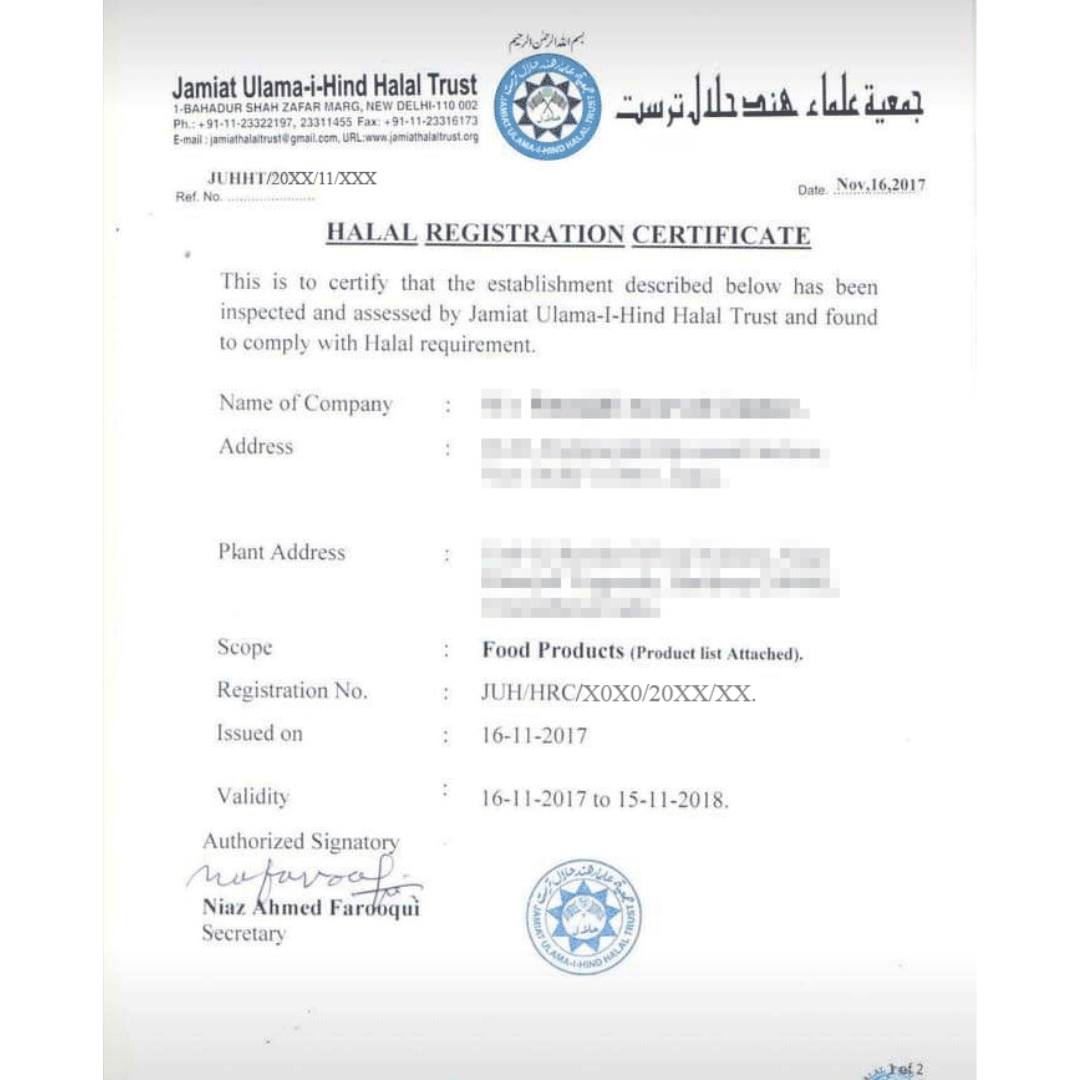Halal Certificate
Halal certification is a process through which products are verified to adhere to Islamic dietary laws. This certification ensures that the ingredients, preparation, and handling of the product comply with Islamic principles, making it permissible for consumption by Muslims. The certification typically involves rigorous inspection and verification by qualified authorities to guarantee compliance with halal standards. This certification is not only important for meeting the dietary requirements of Muslim consumers but also for gaining access to halal markets globally, which represent a significant segment of the consumer base.
Halal Certification in India -
Halal Certification: In a diverse and culturally rich country like India, food plays a pivotal role in daily life. The Indian culinary landscape is an amalgamation of flavors, traditions, and preferences. One important aspect of food that has gained significant attention is Halal certification.
Halal Registration is a type of certification required by businesses that want to sell their products to muslim consumers However the scope of certification is extended to cosmetic and pharmaceutical products. Getting a halal certificate is a completely voluntary process without any interference by any government body. However in the case of exporting food products Halal is often required by Importing islamic countries such as in the Middle east.
At Professional Utilities, we offer halal certification service to manufacturers and businesses to fulfill their halal compliance. Our team of experts can guide you through the whole process and its requirements.

Nidhi Company - Incorporation Certificate [Sample]

What is Halal?
Halal, in Arabic, means “permissible” or “lawful“. In the context of food and beverages, it refers to products that comply with Islamic dietary laws. These laws dictate what is allowed and what is prohibited. For example, only certain animals are considered halal, and they must be slaughtered in a specific way. halal food and beverages cannot contain any alcohol or prohibited ingredients.
Importance of Halal Certification
Halal certification is essential for Muslims who strictly adhere to Islamic dietary laws. It ensures that the food they consume aligns with their religious beliefs. It is not limited to Muslims alone non-Muslims also seek Halal-certified products for various reasons, including quality assurance.
Who Grants Halal Certification?
In India, several organizations are responsible for granting Halal certification. The certification is provided by a third party organization, such as Jamiat Ulama-i-Hind Halal Trust, in adherence with Islamic laws. These organizations are entrusted with the task of inspecting and certifying food products, restaurants, and manufacturing units.

Documents Required for Halal Certification
These are the List of documents required to be enclosed for Halal Registration Certificate:-
- Address proof of the business
- PAN card details of the business
- Complete details of all the products
- A copy of the export license (if applicable)
- Sample of products in the original packaging
- A duly filled application on the company's letterhead
- Machines and techniques for the preservation of goods
- Details of all the materials that are used for manufacturing the product
- A letter from a government authorized lab that certifies the ingredients used in the product
- The product does not contain pork
- Any preservatives being used are halal-certified
- The product is free from animal-based gelatine
- The product does not contain alcohol
Process of Halal Registration
The process of obtaining Halal certification involves several steps:
- Application Submission:Application Submission: Businesses interested in certification submit an application to the certifying body.
- Documentation Review: The certifying body reviews all documents related to the production process, ingredients, and handling of food products.
- On-site Inspection: A team from the certifying body conducts an on-site inspection of the facility to ensure compliance with Halal standards.
- Approval and Certification: Upon successful inspection and compliance, the business is granted Halal certification.
The Significance of Halal Certification
- Meeting Religious Requirements: For Muslims, consuming Halal-certified products is not just a preference; it’s a religious obligation. Halal certification ensures that they can fulfill their dietary requirements without compromising their faith.
- Market Expansion: For businesses, obtaining Halal certification can open doors to new markets, both domestically and internationally. India has a significant Muslim population, and catering to their dietary needs can be a lucrative venture.
- Quality Assurance: Halal certification is often associated with higher quality and hygiene standards. This perception of quality attracts not only Muslim consumers but also non-Muslims who seek assurance in the products they consume.
- Label Transparency: A Halal certification label on a product provides transparency about its ingredients and production process. This transparency builds trust between the consumer and the brand.
Challenges in Obtaining Halal Certification
- Stringent Requirements: Meeting the strict requirements for Halal certification can be challenging for businesses, especially small-scale produce ₹ The need for dedicated facilities, separate utensils, and certified ingredients can increase production costs.
- Documentation and Compliance: Maintaining comprehensive documentation and ensuring continuous compliance with Halal standards can be an administrative burden for businesses.
A FinTech platform that understands your need
A comprehensive package of services for starting and managing your whole business, offered to you by a firm with a long-term goal to improve the way you do business.
